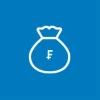Which bank accounts do you have to declare in your Swiss tax returns? How are bank accounts taxed? This moneyland.ch guide answers the most important questions about bank accounts and Swiss taxes.
Which bank accounts do I have to declare in my tax returns?
Simply put: All of your bank accounts must be declared in your Swiss tax returns.
That includes:
- Private accounts (also known as personal accounts, salary accounts, or checking accounts)
- Savings accounts
- Security deposit accounts for properties you rent
- Stock brokerage accounts (custody accounts, trading accounts)
- Current accounts
Be careful not to forget rental home security deposit accounts and savings accounts with little or no money in them. You also have to declare bank accounts held by your children, for children who do not submit their own tax returns.
Accounts at neobanks and accounts at banks outside of Switzerland also have to be declared in your tax returns.
The only accounts that you do not have to declare in your Swiss tax returns are pillar 3a accounts and vested benefits accounts.
Which other banking products do I have to declare?
All of your assets have to be declared in the securities declaration form of your Swiss tax return.
Bank products that have to be declared, in addition to bank accounts, include:
- Medium-term notes
- Fixed deposits
- Custody accounts (stock brokerage accounts)
- Asset management mandates
- Card accounts (credit card accounts with positive balances, for example)
Pillar 3a and vested benefits investment solutions – like retirement funds and retirement asset management mandates – are an exception to this rule. These do not have to be declared in your Swiss tax returns.
Which information about my bank accounts do I have to declare?
You have to declare the balance of each bank account and the official value of securities as per December 31 of the calendar year for which you are submitting your tax return.
You also have to declare all the interest payments and dividends you received over the course of the calendar year.
Swiss banks provide you with special statements for Swiss tax purposes. These figures that you need to enter in the securities declaration form of your tax return are clearly shown on the bank statements.
Declaring your bank accounts is relatively easy. You simply need to enter the details of each account on a separate line on the securities declaration form.
How easy or difficult it is to declare securities, like stocks and ETFs, depends on whether or not your bank provides you with a comprehensive securities statement (also known as a tax statement). If it does, you can simply enter the total value of your investment portfolio on the securities declaration form. The process is also simple if you receive an e-tax statement, in which case you can simply upload the statement on the website or in the app of the tax administration when completing tax returns electronically. These solutions for tax purposes are practical, but many Swiss banks charge a fee for them. You can find a list of the fees charged by Swiss banks in the moneyland.ch guides on tax statements and e-tax statements.
Declaring your investments is more complicated if you have to list all the securities you hold manually. That is always necessary when you do not receive a comprehensive securities statement or an electronic statement from your bank. In this case, you have to fill out the details for each security individually on separate lines.
How are bank accounts taxed?
In Switzerland, taxes are levied on both your wealth and your income.
The balances of your bank accounts and the official value of your investment assets both count towards your personal wealth. Cantons levy a wealth tax on the taxable portion of your wealth.
However, people with relatively little personal wealth do not need to pay wealth taxes because of the substantial tax exemptions. These exemptions vary hugely between cantons. For example, a single adult living in Valais is taxed on the part of their wealth which exceeds 30,000 francs, while the exemption in the canton of Zurich is 80,000 francs. Exemptions are about twice as high for married couples.
Income from interest and dividends counts towards your taxable income. As a private individual, you do not need to pay taxes on capital gains from stock market investments, unless you are classified as a professional investor.
Which tax deductions apply to bank accounts?
There is a tax deduction for interest earned on savings.
However, many people cannot benefit from this tax deduction because of its relatively low limit. The maximum amount you can deduct varies depending on whether you also claim the pillar 3a tax deduction. The tax deduction is for both interest earned on savings and insurance premiums for health insurance (after deducting premium reductions), life insurance, and voluntary accident insurance. Example: If you did not contribute to the pillar 3a and you paid less than 225 francs in monthly premiums for eligible insurance, then you will still have room to deduct interest earned from bank accounts. This example applies to the federal income tax. The thresholds are different for cantonal taxes.
You cannot deduct bank fees and charges, such as the basic, ongoing fees of bank accounts, bank packages, debit cards, and credit cards, or fees charged for cash withdrawals.
If you own securities like shares in stocks and funds, you can deduct some of the costs related to these investments. For example, you can deduct custody fees for holding these securities in a stock brokerage account. You can also deduct the costs of securities statements. You can find detailed information in the moneyland.ch guide to Swiss tax deductions for investors.
Can I receive tax refunds?
If you properly declare your accounts and assets in your tax returns, the withholding taxes deducted from interest and dividend payments by Swiss banks will be paid out to you as a tax refund. This applies to interest from bank accounts, and dividends from securities.
Take extra care to declare your yields from interest and dividends in the correct column on your tax return. There are two different columns – one for yields from which the Swiss withholding tax was deducted, and another for yields which were not subject to the Swiss withholding tax.
More on this topic:
Find all Swiss bank account and card comparisons here
Find all Swiss retirement and investment comparisons here
Simple tips for lowering your taxes in Switzerland


 Deal of the Day
Deal of the Day 








